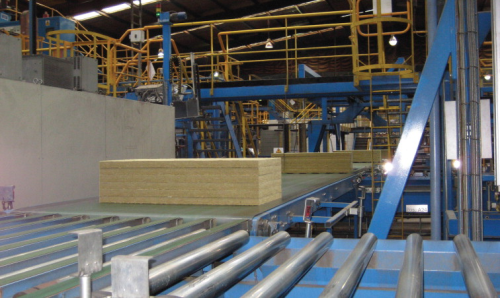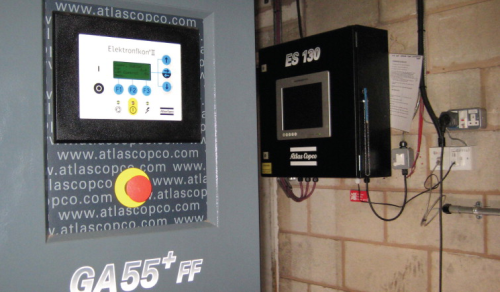

A pdf version of this article is available on the right-hand side, under 'Downloads''
Over the past few years, a multimillion-pound investment at Knauf Insulation's rock mineral wool production facility at Queensferry in North Wales has resulted in all parts of the production line being either replaced or upgraded, including the plant's compressed air system. This £10 million upgrade programme has resulted in a major capacity increase, together with significant advances in material and product development as well as the introduction of new items.
High quality compressed air plays a vital role, so keeping pace with the latest innovative technology and energy-efficient compressed air solutions has been an important role for engineering manager, Philip Bishop. As he explains: “In our specific applications, the quality of the compressed air is very important. What is equally important to us is energy efficiency. Our corporate slogan is ‘It's time to save energy’ and we are very serious about it. Our company mission is to become world leader in energy efficient systems for buildings, so we look at the energy efficiency of plant equipment involved in our production processes in much the same way. And we find that Atlas Copco's compressed air system solutions have met both of these important criteria.”
Finding an effective solution
Atlas Copco Compressors' relationship with the Queensferry plant started ten years ago when it was invited to recommend a replacement for a competitor's compressor plant installation which was subject to overheating, oil leaks, had no drying facility and was allowing damaging moisture into the air supply.
With the application of Atlas Copco's measurement (ME) box survey techniques it was possible to establish a true indication of Knauf's air usage. The ME box is a device for analysing a plant's compressed air demand and, most importantly, any wastage incurred in producing it.
The software programme enabled simulated compressor comparisons to be made against the actual system operation and thus provide an indication of how the compressed air system could be improved for maximum efficiency and reduced costs. Based on that information, it was possible to submit recommendations for the installation of the most energy efficient compressed air solutions available to match the company's production needs.
Compressed air is utilised for the air-atomised binder sprays and for the reverse jet bag filters which handle fibre and dust, including recycling systems. It plays an important role in the plant's packaging machinery functions and for general plant air required for operating pneumatic cylinders, actuators for valves, dampers, bin doors, diverter chutes, etc.
Since compressed air does not come into direct contact with finished product within any stage of Knauf Insulation's Queensferry production operations, it was decided that two Atlas Copco oil-injected rotary screw compressors would fulfil the process need and were selected to replace the existing plant. As a result the company entered into a five-year lease contract for the installation of a GA75 Full Feature machine and a GA75 VSD Full Feature unit.
Improving efficiency
Some four years later, it was time to review the situation to ensure that the installation was still relevant to the manufacturing processes. Were these the right machines? Were they the right combination of machines? Had the process needs changed in any way or were they likely to do so in the future?
Atlas Copco's AIRScan audit team got to work once more and presented their new proposals based on simulations. The recommendation and agreement was for two GA55+ fixed speed machines and a GA55 VSD, all full feature machines with integral dryers. Together with output controlled by an ES 130 unit and AIRConnect remote monitoring, this combination allowed one fixed machine to run as a base load supply unit that could be topped up by the Variable Speed Drive compressor or, on low production demand, just to run the VSD machine by itself. This three-machine option also allowed for maintenance on any one unit without reduction in capacity.
Although the 165 l/s output of each of the smaller replacement compressors is lower than those of the original installation, the improved efficiency of the units means that their net capacity is more than sufficient to meet the increased plant air requirements.
Furthermore, this decision satisfied Knauf Insulation's primary considerations of total reliability and optimum energy efficiency. To ensure that those standards were maintained at all times, and for Philip Bishop's peace of mind, the equipment was covered by a Total Responsibility Service Plan contract with 24/7 support coming from Atlas Copco's local Service Centre sited just 30 minutes away in Warrington.
Energy conservation
This successful synergy between manufacturer and compressed air solutions provider is all the more significant because of the nature of the business it serves. With a global mission to conserve energy, and the prospect of an inevitable increase in demand for its products, Knauf Insulation is leading by its own example.


